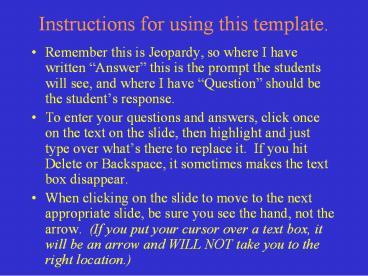Instructions for using this template. - PowerPoint PPT Presentation
1 / 66
Title:
Instructions for using this template.
Description:
Instructions for using this template. Remember this is Jeopardy, so where I have written Answer this is the prompt the students will see, and where I have ... – PowerPoint PPT presentation
Number of Views:47
Avg rating:3.0/5.0
Title: Instructions for using this template.
1
Instructions for using this template.
- Remember this is Jeopardy, so where I have
written Answer this is the prompt the students
will see, and where I have Question should be
the students response. - To enter your questions and answers, click once
on the text on the slide, then highlight and just
type over whats there to replace it. If you hit
Delete or Backspace, it sometimes makes the text
box disappear. - When clicking on the slide to move to the next
appropriate slide, be sure you see the hand, not
the arrow. (If you put your cursor over a text
box, it will be an arrow and WILL NOT take you to
the right location.)
2
Jeopardy
Choose a category. You will be given the
answer. You must give the correct question.
Click to begin.
3
Choose a point value.
Choose a point value.
Click here for Final Jeopardy
4
1
2
4
5
6
3
10 Points
10 Points
10 Points
10 Points
10 Points
10 Points
20 Points
20 Points
20 Points
20 Points
20 Points
20 Points
30 Points
30 Points
30 Points
30 Points
30 Points
30 Points
40 Points
40 Points
40 Points
40 Points
40 Points
40 Points
50 Points
50 Points
50 Points
50 Points
50 Points
50 Points
5
True/False Puritan communities with 50 or more
families were required to set up schools
6
True
7
True/False Montesquieu believed that government
should have centralized, unlimited power
8
False He believed government power should be
limited, defined, and separated into three
branches
9
True/False Locke believed all people are born
with natural and inalienable rights
10
True
11
True/False Large families were considered a
burden on family farms
12
False large families were beneficial because
they provided more workers
13
True/False The gentry of colonial society were
few and powerful
14
True
15
Name two rights guaranteed to people in England
by Magna Carta
16
Right to trial by jury Property protected
17
What was Englands first permanent settlement in
North America?
18
Jamestown
19
What was the climate in New England like?
20
Short, warm summers with long, snowy winters
21
Why did the Puritans leave England?
22
They wanted to freely practice their religion and
escape persecution by the King
23
Who did freedom of religion apply to for the
Puritans?
24
Only the Puritans
25
How did the founders of Pennsylvania differ from
the founders of Massachusetts in matters of
religion?
26
The founders of Pennsylvania believed in
religious toleration
27
What was the first act of self-government in the
Americas? (Hint Jamestown)
28
Electing the House of Burgesses
29
How did a young man learn a trade in colonial
times?
30
They became an apprentice
31
What were free Africans allowed to do while
living in the colonies?
32
Be slaveholders and own property
33
What percent of slaves died or committed suicide
on the voyage across the Atlantic?
34
15-20
35
What people were NOT protected by Marylands Act
of Toleration?
36
Non-Christians
37
What did colonial schools teach that modern
public schools do not?
38
Religion
39
What was the Great Awakening?
40
A religious revival where people recommitted
themselves to God
41
Why did the Pilgrims create the Mayflower Compact?
42
To ensure their new colony was governed fairly
43
Who had the right to vote in the English colonies?
44
White men who owned property
45
What did slave owners establish to prevent slaves
from revolting?
46
Slave Codes
47
This was the term for a person that agreed to
work for a period of time in exchange for passage
to America
48
Indentured servant
49
If accused of a crime, Magna Carta guaranteed the
right to what?
50
Trial by jury
51
What crop proved to be a dependable source of
income for Virginia?
52
tobacco
53
Which groups were allowed to vote in America?
54
White, property owning adult men
55
What did the southern economy rely on to support
the plantation system?
56
slavery
57
Upper class of colonial society
58
gentry
59
Public schools
60
Schools supported by taxes
61
Belief that a colony exists for the economic
benefit of the parent country
62
mercantilism
63
The Magna Carta was the first document to do what?
64
Limit the power of the King
65
Final Jeopardy
Make your wager
66
How do the writings of Locke and Montesquieu
change American ways of thinking?
67
They get Americans believing that they have a
right to self-government, and should not be
subject to the will of the king































